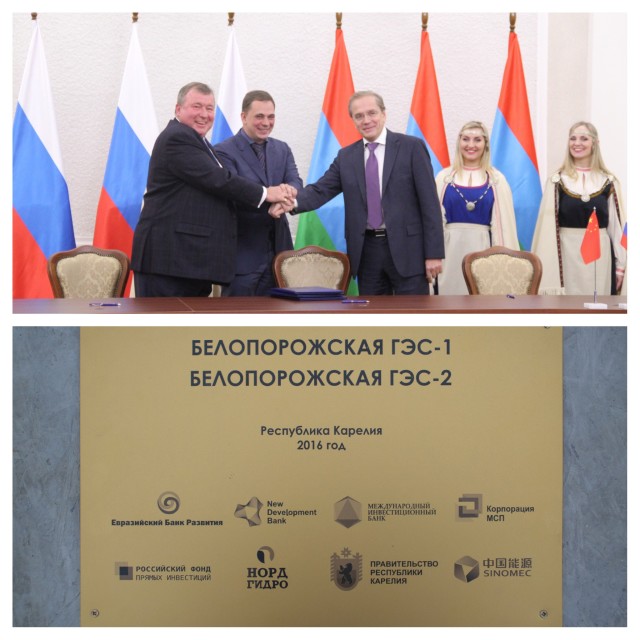IIB has returned to financing of large-scale infrastructure projects – construction of RUB 11.8 billion hydropower plants launched

In the Republic of Karelia, works were launched on the construction of two hydropower plants (Byeloporozhskaya HPP-1 and Byeloporozhskaya HPP-2) with a total capacity of 49.8 MW – the first investment project on the territory of Russia by the New Development Bank (NDB), created by the BRICS countries. According to the approved scheme, two multilateral financial institutions, the International Investment Bank (IIB) and the Eurasian Development Bank (EDB), are directly financing the implementation.
The IIB and the EDB will open a credit line in equal parts for a total of RUB 8.15 billion on the basis of approved funding from the NDB in the amount of USD 50 million for each institution. At the same time, JSC Corporation SME guarantees 50% of the loan. Apart from JSC Nord Hydro, investors in LLC Nord Hydro - White Threshold include the Russian Direct Investment Fund and the Chinese corporation SINOMEC – China State Energy Engineering Corp. The total amount of the investment – RUB 11.8 billion.
On October 11, 2016 in Petrozavodsk, the signing ceremony of the project documentation took place, including the financing agreement between JSC Nord Hydro - White Threshold, the IIB and the EDB. The ceremonies marking the beginning of works continued in the municipal district of Kem. On the Beliy rapids of the river Kem, Head of the Republic of Karelia, Alexander Khudilainen, in the presence of representatives from banks, investment funds, Russian and Chinese engineering and construction corporations and representatives of the Government Office of the Russian Federation, launched the construction. The participants poured the first cube of concrete for the foundation of the hydropower plants and set in place the so-called "time capsule", symbolizing the beginning of the construction to be completed by the end of 2019.
Nikolay Kosov, Chairman of IIB Board, said: "Through the beginning of the construction of Byeloporozhskie hydropower plants, a new page opens in the history of sustainable energy in Russia’s Northwest and the International Investment Bank returns to supporting large-scale infrastructure projects. In the current environment, joint activities of international financial institutions represent the most effective way of promoting economic development, and I am delighted that this project was the first result of our partnership with the NDB and the EDB."
He added that the construction of the small-scale power plants would give an additional impetus to socio-economic development of Karelia, while promoting foreign trade and integration among member countries of the IIB. It is expected that the localisation of production in Russia of building materials and hydromechanical components for the plants will account for up to 75%, with part of the equipment being manufactured and delivered to the region by the subsidiary of Russian JSC Tyazhmash in another shareholder country of the Bank – the Czech Republic.
From his side, Chairman of the EDB’s Management Board, Dmitry Pankin, commented: "This is the first project of this magnitude in the smaller power generation sector of Russia, and also the first project in our country attracting funding from the BRICS bank. The project contributes to the development of infrastructure supporting other sectors of the economy, and is associated with the significant hydropower potential of small rivers. Its implementation aims to create a "green" power generation in an energy-deficient region. All of these factors correspond to the strategic objectives and mission of the Bank."
In Karelia, this is the fourth project by Nord Hydro – which builds small, ready-to-operate hydropower stations – the implementation of which shall introduce new advanced technologies. The construction site will become a unique platform for innovations with the application of contemporary Russian technological developments. Byeloporozhskie plants have a significant social component – the project will create 400 jobs during the construction phase and 30 more high-skill jobs for its operation, and the Republic will benefit from additional tax revenues.
Thus, Alexander Khudilainen emphasised that the construction of two hydropower stations on the territory of the Kem region will allow to fix the cost of energy to consumers at a reasonable level, and will solve the problem of electricity shortages. "Renewable, clean energy sources – this is the future of the industry, its new, stable, uninterrupted energy sources available to consumers, that ensure a better quality of life", – he said.
For the IIB, the construction of hydropower plants in Karelia has a number of unique features. Most importantly, this is the first large-scale and "green" infrastructure project of the Bank after the relaunch of its activities in 2012. Therefore, today the renewed institution once again begins to invest in this sector, with rich experience in financing large energy and transport infrastructure in the 1970s and 1980s. It is expected that Byeloporozhskie stations will be a flagship project of the IIB in Russia, setting an example for the Bank’s activities in other member states. Secondly, it is also the largest loan in its portfolio, and its maturity is among the longest. Finally, for the first time, the Bank is providing financing in the local currency. In this case, it is important that the project is included in the state program of support for renewable energy sources, is listed among priority projects of the federal target program “Development of the Republic of Karelia for the Period until 2020” and is guaranteed by JSC Corporation SME, with which the IIB intends to continue cooperating in this direction.
